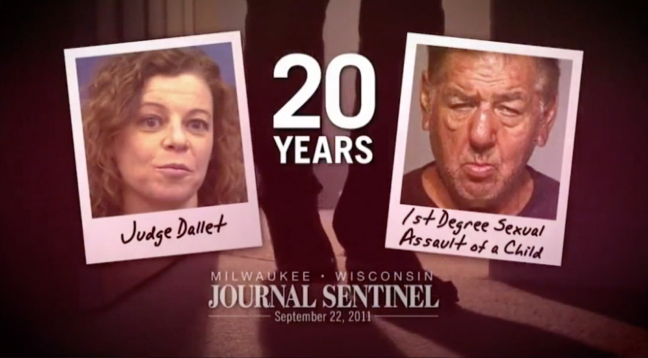Tuesday night the Wisconsin Supreme Court Race ended in triumph for Milwaukee’s Democrat-backed Judge Rebecca Dallet. Dallet trounced Sauk County Judge Michael Screnock by a significant margin, spelling trouble for state conservatives.
The results and their implications for Wisconsin in the 2018 midterms are a different story. The weeks before the pivotal election day were full of uncertainty, with many pointing to the race as an indicator for the path of future elections.
Faced with impending change, it wasn’t long before the political campaign ads emerged, attempting to sway voters. Wisconsin Manufacturers & Commerce spent almost $1 million to air ads against Dallet, citing a case she presided over involving child molestation. The ad suggested Dallet had been too lenient with the offender, giving him two years instead of the maximum 20-year sentence.
The ad ran on television and radio for weeks. The offender’s full name and photograph — as well as his relationship to the victims — were blasted across Wisconsin television screens during primetime. Constantly returning to a video of a child actor sitting forlornly on a swing set, it painted Dallet as inconceivably soft on child abuse.
Dallet’s supporters hit back with their own attack ads, citing her strong record on child abuse cases and criticizing Screnock’s in turn. The issue of child abuse somehow had become the central arguing point for the non-partisan race.
Response to controversial Dove ad campaign shows power of manipulative media
On March 29, the family of the children depicted in the WMC advertisement called on the group to remove the spot. They claimed that the ad used specific details that revealed the two child victims’ identities. The offender’s full name and his relation to the victims were used in the ad, theoretically making identification of the victims possible.
Most outlets that covered the case declined to use these details in their coverage. Despite continued pleas from the family, WMC refused to remove the ad. They labelled the ad’s content as critical knowledge concerning Dallet’s record, stating it “merely repeats publicly available information from public records.”
Screnock refused to condemn the ad or ask for its removal. Though the ad did not break any laws, most political organizations, in such cases, choose not to provide potentially identifying information out of respect for the victims. This can entail the removal of names, photographs and other details.
The ad, as well as WMC’s refusal to remove it from broadcast, only serve to further traumatize and disregard child abuse survivors.
Using child molestation sentencing as a political tool is both callous and reprehensible, regardless of political affiliation. The use of both the offender’s name and relation to the victims was not only harmful but redundant in conveying the message of the ad.
As viewers, child abuse shocks and horrifies. The cases’ public details— such as the ages of the children involved — captivate us, making them an effective political instrument. The offender’s mugshot draws us in, gluing us momentarily to our TV screens.
UW professors determine Trump’s ‘rating bonanza’ led to success in polls
But this captivation does not validate the usage of child abuse cases. It very rarely captures anything politically relevant, nor does it respect the trauma of victims. It does not take into account that child victims are sometimes too young to testify against their abusers, or that testifying could further traumatize them. It does not take into account the plea deals often made in situations like these in order to spare the entire family further trauma.
Given the children depicted in the advertisement had to see their abuser’s face on television repeatedly should be the most horrifying aspect of this campaign. The trauma and suffering this must have re-inflicted upon the family are unimaginable.
These children are easily identifiable to anyone capable of using Google or a phonebook. One, if not both, are adults now — they did not ask for the ad to be aired. They were instead used as unwilling political pawns, only to be swiftly abandoned after Screnock’s loss.
The introduction to a journal article about child abuse reporting captured this feeling in a former victim’s quote.
“It was just really hard to hold your head up, even to walk outside with everyone almost in the world knowing what happened … I shouldn’t care what people think or say. It’s just the fact that everyone knows I’m the kid,” the article states.
Screnock might be decrying the “blue wave” about to overtake the state, but the children his supporters used will be dealing with repercussions of this identification for the rest of their lives. The only question that can be asked of WMC today is this.
Was it worth it?
Julia Brunson ([email protected]) is a sophomore majoring in history.





















